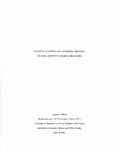Medieval Fasting and Anorexia Nervosa as Goal-Oriented Ascetic Practices (thesis)

View/
Author
Miller, Lauren Jill
Subject
Washington and Lee University -- Honors in Religion
Fasting -- Religious aspects
Anorexia nervosa -- Religious aspects
Asceticism
Metadata
Show full item recordDescription
Thesis; [FULL-TEXT RESTRICTED TO WASHINGTON AND LEE UNIVERSITY LOGIN] Lauren Jill Miller is a member of the Class of 2011 of Washington and Lee University. This paper analyzes various theories of asceticism and the body and assesses those theories in the context of two behaviors typically considered to have ascetic components: medieval female fasting and modem anorexia nervosa as it emerges in women. In the context of medieval fasting, the contributions of Rudolph Bell and Caroline Walker Bynum, among others, are considered. This research pays particular attention to Bynum's theories of active and goaloriented medieval asceticism, and proposes ways that these theories could apply to anorexia. In the modem context, the ascetic and religious components of anorexia are explored through an analysis of memoirs of anorectics, advertising and media, and psychological research suggesting implicit links between holiness and thinness. The paper evaluates various ideas concerning the validity of forging comparisons between medieval fasting and anorexia, and it proposes that some forms of comparison between the two could be appropriate and helpful, to a greater extent than most scholars have previously argued. With respect to theories of asceticism, this work primarily deals with the notions of ascetic practice proposed by Max Weber and Sigmund Freud. Both medieval and modem forms of fasting are explored through the theoretical lenses provided by these scholars; it is argued that Freudian theory has been incorporated into an overly myopic view of ascetic practice, and that Weberian concepts of "inner-worldly," active asceticism should be considered more thoroughly in these contexts. Lastly, the work speculates on some other ways of viewing anorexia nervosa as a religious phenomenon, touching on the contributions of religious theorists such as Emile Durkheim, Mary Douglas, and Karl Marx.
Collections
The following license files are associated with this item: